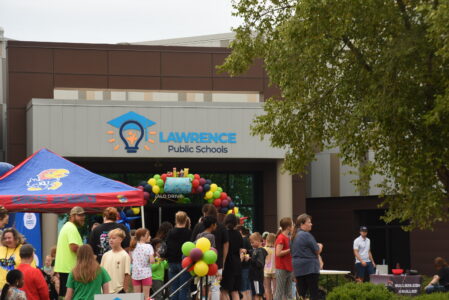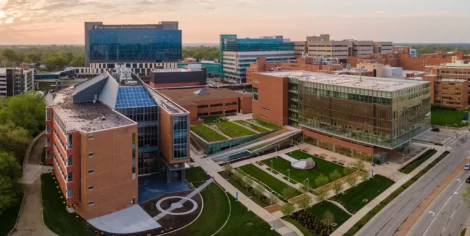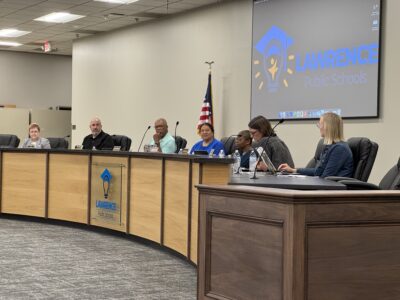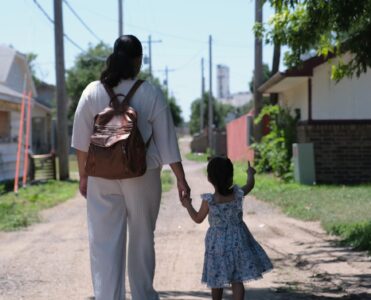No film tax credits, affordable housing setback: Lobbyist for Lawrence Chamber looks back at the 2025 legislative session

photo by: Bremen Keasey
Sandy Braden, the Chairman of the lobbying firm of Braden Heidner Lowe & Associates, spoke during a Wednesday afternoon meeting held by the Lawrence Chamber of Commerce about the how legislation supported by the Chamber fared in the state legislature.
In the Kansas Legislature’s short session this year, the Lawrence chamber of commerce didn’t get everything it wanted, but some things on its wish list — like affordable housing measures and tax breaks for film productions — may get another shot in future sessions.
That’s according to Sandy Braden, chair of the lobbying firm Braden Heidner Lowe & Associates, which lobbies for the Chamber’s priorities in the Legislature. At a luncheon with the Chamber on Wednesday, Braden gave local leaders an update on the firm’s work in this year’s legislative session, which ended on April 11.
Braden noted that the legislative session for 2025 was shorter than usual — typically, the Legislature adjourns in early May, not in April. The shorter session meant everyone “had to work harder,” she said, and not all legislation that was proposed made it to the finish line.
One bill that didn’t get all the way there was one that the Chamber thought could spark more arts-related economic activity in Lawrence — Senate Bill 52, a bill that would create tax breaks for film productions in the state. It passed the Senate but did not get all the way through the House.
Braden said the proposal is “still alive” for the 2026 legislative session, though it was a disappointment that it didn’t pass this year.
Another disappointment for some local leaders was the passage of House Bill 2289, which scales back the state’s affordable housing tax credit program.
The bill eliminates, after 2025, a 4% tax credit that has been used by many projects in Lawrence, including for several hundred rent-controlled apartment units in Lawrence near the South Lawrence Trafficway. Additionally, the bill placed a cap of $8.8 million in tax credits that can be issued in total for Kansas affordable housing projects in any given year.
One prominent local developer, Tony Krsnich, is the legislative chair for the Kansas Housing Association and told the Journal-World after the bill passed that “What I can tell you is we are (expletive.)” He said the Kansas Housing Association would be lobbying for a reversal of the bill in 2026.
On Wednesday, Braden sounded a more optimistic note, saying that lobbying efforts this year at least succeeded in preventing the tax credit program from being completely eliminated. But the fight over these credits isn’t over yet. The bill won’t get rid of the entire program right now, but it will entirely end the program after 2028 unless the Legislature takes specific action to extend it.
Douglas County’s delegation of Democratic lawmakers split on the bill. Most voted against it, but Rep. Barbara Ballard and Sen. Marci Francisco both voted to limit the tax credits, and Francisco explained her vote by saying that the credits were “much valued but unaffordable.”
At Wednesday’s luncheon, Francisco said that during debates on the bill, she had asked about what the future of affordable housing support in Kansas would look like. She said the state would have time to have those conversations before that 2028 deadline.
“That sunset gives us two or three years to try to say what is an appropriate amount for the state to be investing (in affordable housing),” Francisco said.
Although the 2025 session is over and the next session doesn’t start until January 2026, the Legislature still has work to do this year. Braden said the Legislature will have 82 days of interim committees, which are put together to look at specific issues and can recommend legislation but not pass it. One of those will look at the issue of building more housing across the state, Braden said.
Looking even further out, Braden said that a key year to focus on in Topeka might be 2029. Braden said the state has done a good job in recent years of building a rainy-day fund and using its surplus well, but that the surplus won’t last forever. It will be “narrowing down” until about 2029, Braden said, and that year is a potential “tipping point” for when the state’s budget situation might change.
Along with the updates from the state Legislature, the luncheon attendees were briefed about recent meetings between local officials and Kansas’ congressional delegation.
Evie Lazzarino, the Chamber’s vice president of external affairs, said a delegation from the Chamber, the city and county governments and the University of Kansas recently met with both of the congressmen representing Douglas County in the U.S. House — Republican Reps. Tracey Mann and Derek Schmidt — and staff for Kansas’ two U.S. senators, Republicans Roger Marshall and Jerry Moran.
Lazzarino said the group talked about the effects of the Trump administration’s cuts on higher education in Lawrence, including the firings at Haskell Indian Nations University and the cuts to federal research funding that could affect KU. They also discussed preparations for the 2026 FIFA World Cup, including potential funding for security, and Lazzarino also said she met about this issue with Democratic U.S. Rep. Sharice Davids’ staff, which has been very involved in the World Cup efforts.







